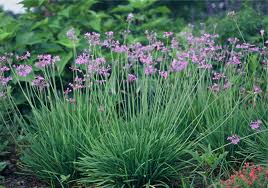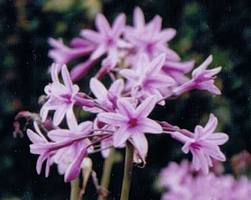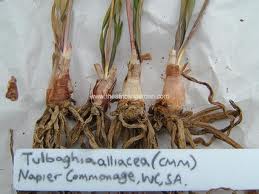Because I am asked about it all the time I decided to do an article on it: Yes, you can eat Society Garlic… well… most of it, maybe all of it.
The flowers and leaves are edible raw, no debate there. The peppery leaves can be used like garlic in salads and other dishes. The flowers are on the peppery sweet side, onion-ish. The bulbs, however, are more medicinal though there are reports of them being eaten as well. A native of South Africa it is a favored food and medicine of the Zulus. The botanical name is Tulbaghia violacea (tool-BAG-ee-uh vee-oh-LAY-see-ay or vie-oh-LAY-see-ay) Tulbaghia honors Ryk Tulbagh, 1699-1771, governor of the Cape of Good Hope. Violacea means violet-like, referring to the blossom.
One of the odd aspects of the most of the plants in the genus is that they are pollinated by moths at night when the plant manages to be lightly scented. T. violacea however is scented in the day and pollinated by bees and butterflies. (Moths are out only at night and butterflies only in the day.)
A second species, Tulbaghia alliacea, Isikhwa or Wild Garlic, is used in a similar fashion except its bulbs are cooked with meat or roasted and eaten. There are at least two cultivars, “John Rider” and “Silver Lace.” Their leaves and flowers also edible. The Silver Lace cultivar has a white stripe on each side of the leaf. Also edible is Tulbaghia ciolacea.
It’s called Society Garlic because Dutch settlers to South Africa thought it was a more polite spice to use for flavoring dishes than true garlic particularly for social events. Oh… and alliacea… (al-lee-AY-see-uh) means like onions.
Green Deane’s “Itemized” Plant Profile
IDENTIFICATION: Society Garlic is a fast-growing, bulbous plant about two feet tall. Leaves are long, narrow, strap-like, slightly fleshy and smell strongly of garlic when bruised. They grow from fat, tuberous roots which spread to form clumps of plants. The pinkish to mauve, tubular flowers, clustered into umbels of up to twenty flowers are on flower stalks above the leaves. They smell of garlic when picked. Triangular capsules replace the flowers and are grouped into a head. When ripe they split to release flattened, hard black seeds.
TIME OF YEAR: Your local summer or all year round in warm climates
ENVIRONMENT: Drought resistant, most soils, sunny or partial shade.
METHOD OF PREPERATION: Leaves and flowers raw, or cooked. Bulbs are reportedly edible but I have not tried them. Medicinally the crushed leaves have been used to treat sinus headaches, the fresh bulbs are boiled in water and the decoction taken orally to clear up colds and coughs. They have also been used for pulmonary tuberculosis and intestinal worms. The aroma also repels insects.
Herb Blurb
Posted here as published: Aspergillus flavus and Aspergillus parasiticus are important plant pathogens and causal agents of pre- and postharvest rots of corn, peanuts, and tree nuts. These fungal pathogens cause significant crop losses and produce aflatoxins, which contaminate many food products and contribute to liver cancer worldwide. Aqueous preparations of Tulbaghia violacea (wild garlic) were antifungal and at 10 mg/ml resulted in sustained growth inhibition of greater than 50% for both A. flavus and A. parasiticus. Light microscopy revealed that the plant extract inhibited conidial germination in a dose-dependent manner. When exposed to T. violacea extract concentrations of 10 mg/ml and above, A. parasiticus conidia began germinating earlier and germination was completed before that of A. flavus, indicating that A. parasiticus conidia were more resistant to the antifungal effects of T. violacea than were A. flavus conidia. At a subinhibitory extract dose of 15 mg/ml, hyphae of both fungal species exhibited increased granulation and vesicle formation, possibly due to increased reactivity between hyphal cellular components and T. violacea extract. These hyphal changes were not seen when hyphae were formed in the absence of the extract. Transmission electron microscopy revealed thickening of conidial cell walls in both fungal species when grown in the presence of the plant extract. Cell walls of A. flavus also became considerably thicker than those of A. parasiticus, indicating differential response to the extract. Aqueous preparations of T. violacea can be used as antifungal treatments for the control of A. flavus and A. parasiticus. Because the extract exhibited a more pronounced effect on A. flavus than on A. parasiticus, higher doses may be needed for control of A. parasiticus infections.





I was listening to a garden show & a lady wanted to know if society garlic can be eaten like chives. The host on the show said NO! I am sending you this question to find out whether is this true & if there only certain varieties or can all be eaten.
Thanks,
Johnny
The are edible. Gardeners rarely know non-cultivated edibles.
I’ve eaten Society Garlic like chives for years!
I think they are tasty.Found some today came up out of the rocky soil here in Missouri.
I would like to know if Society Garlic is poisonous to livestock, goats and horses.
I haven’t found any references to said or reports of it. The basic answer is I don’t know.
i have a question i have saciaty garlic i noticed the bulbs that dropped the flowers were white not the same as the other not blue and have the same look and taste
I also use society garlic to control the gophers in my yard. I found out about this in 1996 when we where working in Albuquerque that gophers and groundhogs do not like the scent. We placed the plants about twenty feet apart around the house first for about three Weeks then placed a few more on the outer yard by the fences. It worked great.
Great firsthand experience, thanks for sharing. I’ve read that herbs are good foundation plantings for rodent control due to overwhelming their olfactory organs. Rather than disliking the scent, it’s too odiferous to handle…just as it is for us at times.
will society garlic or wild garlic planted around the perimeter of the property repel snakes, rattlesnakes?
No idea… they have a mild garlic odor.
Rather than repel snakes, it may repel the rodents the snakes are searching for.
We see many black racers and the like (in central FL) in the butterfly garden where we have 4-5 soc garlic plants in a 100 sq ft butterfly garden. So I would say no.
I recently saw Societal Garlic with purplish leaves. Is this type edible too?
I’ve never heard of said or seen said. I don’t reallly know.
I was just reading about Tulbaghia varieties, and one was described as having *new* growth that is purple (I don’t recall its name), while another (‘Purpleicious’) is described & shown to have variegated leaves with purple stripes (rather than white stripes, like ‘Silver Lace’). Then there’s another one that reportedly has pink at the leaf bases & tips (‘Flamingo’). . . . So, no telling what else has been developed that I have yet to read about!
My cats love to chew on the leaves…..are they poisonous?
As your cat is still alive….
will society garlic, if planted around a vegetable garden, repel bugs and varmints?
Do deer eat society garlic or is fairly “deer proof”?
Better Homes and Gardens say it is deer resistant.
The deer in San Antonio texas will NOT touch the society garlic. We have about 30 deer in our Gaye’s subdivision and I am
Going on year 7 with them. They a serious drought of 5 years ago they did not eat my society garlic.
The deer have been eating mine. They like the silver lace variety the best- I discovered this morning that all four plants are completely gone.
Deer in Magnolia, TX won’t touch it. Fantastic stuff!
My wife is allergic to garlic. Can she eat Society Garlic?
I really don’t know. It is not in the same genus as garlicl. Is she allergic to onions?
This is my first time foraging on your site as I wanted to know about soceity garlic..( I just planted my first 2 plants )but I am fasinated with growing weeds … I have tried to start wild onions , but have never been succesful in getting them to repeat the next year..right now , I have a lot of what is called locally , MINERS LETTUCE.. it was first used by miners to keep scurvy at bay after a hard winter.. or so I have been told…. I live in California at 5500 feet elevation ….
Soc Garlic here often has off-white flowers as well as the common mauve color plants. I think bulb shade could be related to the soil, perhaps?
It could also be temperatures and or amount of direct sun.
Can you eat all alliums ?
As far as I know, yes.
So, Society Garlic is an Aspergillus protection for the plants that are planted with it or for the person eating it?
Is society garlic a perennial?
It is. It will die back with a freeze but you just clear off the dead bits and it will grow right back with a vengeance. One of the easiest plants you can add to your yard.
Could you eat the stems?
Yes…
Is society onion plant and society garlic plant the same. Are they poisonous to dogs.
I’ve never heard of “Society Onion” so I don’t know. As far as I know they are not toxic to dogs.
Leaves and flowers are edible.
The flowers taste like garlic, but more subtle.
They grow all over drought ridden California.
Great in sunny, dry spots if you don’t mind the slightly skunky odor.
Though I enjoy eating Society garlic, I don’t enjoy the smell, though I love the smell of garlic!
Every where I find Society garlic near air conditioners I also find corrosion on the aluminum fins. I’m pretty sure this plant has an effect on aluminum. Do we have any evidence aside from my own on this?
Should Society Garlic be cut back to ground level? If so, when…January or February?
I don’t know that. I eat them rather than maintain them.
Does Society Garlic repell aphids?
Hi just wondering whether society garlic is high or low FODMAP? LuLu
I’m looking for the botanical name of the garlic bush that has purple flowers. It is blooming at the moment. Can I transplant them now? thank you
Bush or herb? Are you referring to a common ornamental like Society Garlic?
I am a Lowe’s clearance plant junkie. I picked up a social garlic plant for $.25. It was sad and not looking well. Replanted it last year in a large pot, it died off in the winter but can back 200% better. This plant is easy to maintain and grows fast. Flowers are starting to come up. I recommend this plant for anyplace that needs a little fluff of green. I live in the Chattanooga Tn area.
I live in southwest texas. about 20 years ago, a gardener friend gave me a few society garlic plants. a few years later, I noticed that the garlic plants were jumping out of the planter and into the yard. I decided to leave them in the yard since they would repel insects. Well, now, my front yard is turning into a society garlic and wildflower lawn! Society garlic is not very tall and it is an evergreen. I do not have to mow it and it is pretty in the winter season when lawns are brown. I still have to weed unwanted weeds mainly wild carrot. I feel that a gardener could develop this type of lawn over 4 or 5 years by planting the society garlic in different areas, harvesting seed and sowing them.
How, and When, do I trim these? They are growing like crazy in my Backyard!
Does anyone else think this plant can get a strong marijuana odor? Happens a lot after maintenance or high winds.
I actually was served a search warrant because patrolling police in my neighborhood smelled the aroma of my plants, which are many! True facts!
I love society garlic! I have used the flowers and leaves as a culinary for many decades. The plants are also very useful for their low maintenance and hardy characteristics as a landscape plant.